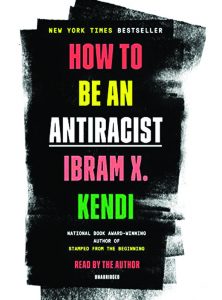5 Ways To Be Antiracist
Resources To Help Guide Your Journey
By Erin Pier
For the GPHN
Many neighbors are hungry for actionable ways they can engage in antiracist work. While there is no quick fix for the racism, injustice and inequity that are woven into the fabric of the systems that surround us, there are steps we can take every day that will lead us in the direction of meaningful change.
This month, we bring you Five Ways To Be Antiracist.
1. Be An Active Voter. From education, criminal justice, and human services, to financial institutions, housing, and healthcare, every system serves to maintain disempowerment for Black and Brown people. The work to truly build an equitable society requires the rebuilding of systems at the political level. Educate yourself on the issues at stake, recognize the powerful impact of state and local politics, and VOTE. (Register to vote at GoVoteColorado.com.)
2. Put Your Money Where Your Heart Is. Be intentional about where you spend your money, and shop at local, Black-owned businesses. Download BBLK (pronounced Black), from bblkapp.com. This app, founded by Denver residents Raymond Murphy and Mariam Kazadi, provides easy access to addresses, hours of operation, and phone numbers for more than 1,100 Black-owned businesses nationwide.
3. Show Up For Racial Justice and Equity Events. Check out the websites and local Black Lives Matter Facebook pages for events and ways to get involved. Stay tuned to Park Hill Neighbors for Equity in Education and EdEquity Corner. When you show up for these events, recognize how personal experience shapes worldview, and if you are white, acknowledge that you will never fully understand the Black experience.
 4. Educate Yourself. Commit to learning more about systemic racism and its effects on Black, Indigenous and People of Color (BIPOC). Some of our favorite reads include: The New Jim Crow: Mass Incarceration in the Age of Colorblindness by Michelle Alexander; Caste: The Origins of our Discontents by Isabel Wilkerson; Mothers of Massive Resistance: White Women and the Politics of White Supremacy by Elizabeth Gillespie McRae; Begin Again: James Baldwin’s America and Its Urgent Lessons for Our Own by Eddie S. Glaude Jr.; For White Folks Who Teach in the Hood… and the Rest of Y’all Too by Christopher Emdin. Pick up a notebook and the book, This Book is Anti-racist by Tiffany Jewell. Commit to completing the 20 lessons for self-reflection on understanding your identities and how they are valued in our society. Make a plan for how to take action. Better yet, invite a friend to join you. Buy these recommended books and more from Black-owned bookstores. Netflix offers a rich variety of TV series, documentaries and movies featuring Black stories for adults as well. Check these out: 13th; LA 92; I am Not Your Negro; Teach Us All; When They See Us; Dear White People; What Happened, Miss Simone; and The Death and Life of Marsha P. Johnson. Listen to a podcast and learn more about how racism impacts education. We recommend: Nice White Parents, by Serial and the New York Times, and The Integrated Schools Podcast, by PHNEE’s own Andrew Leftkowits. Educators may also enjoy Teaching to Thrive by The Abolitionist Teaching Network as well as the podcast Teaching While White.
4. Educate Yourself. Commit to learning more about systemic racism and its effects on Black, Indigenous and People of Color (BIPOC). Some of our favorite reads include: The New Jim Crow: Mass Incarceration in the Age of Colorblindness by Michelle Alexander; Caste: The Origins of our Discontents by Isabel Wilkerson; Mothers of Massive Resistance: White Women and the Politics of White Supremacy by Elizabeth Gillespie McRae; Begin Again: James Baldwin’s America and Its Urgent Lessons for Our Own by Eddie S. Glaude Jr.; For White Folks Who Teach in the Hood… and the Rest of Y’all Too by Christopher Emdin. Pick up a notebook and the book, This Book is Anti-racist by Tiffany Jewell. Commit to completing the 20 lessons for self-reflection on understanding your identities and how they are valued in our society. Make a plan for how to take action. Better yet, invite a friend to join you. Buy these recommended books and more from Black-owned bookstores. Netflix offers a rich variety of TV series, documentaries and movies featuring Black stories for adults as well. Check these out: 13th; LA 92; I am Not Your Negro; Teach Us All; When They See Us; Dear White People; What Happened, Miss Simone; and The Death and Life of Marsha P. Johnson. Listen to a podcast and learn more about how racism impacts education. We recommend: Nice White Parents, by Serial and the New York Times, and The Integrated Schools Podcast, by PHNEE’s own Andrew Leftkowits. Educators may also enjoy Teaching to Thrive by The Abolitionist Teaching Network as well as the podcast Teaching While White.
5. Educate Your Children. Ensure your children are exposed to media featuring BIPOC characters. Take a look at your home library, and read the blog post 7 Questions We Should Ask about Children’s Literature from Oxford University Press (blog.oup.com/2017/09/childrens-literature-race/). Ensure your children have access to books featuring a wide array of culturally and racially diverse protagonists, written by authors who represent the groups they’re writing about. Beyond books, ensure white children view TV series and films featuring non-white and BlPOC characters. A few PHNEE favorites: Motown Magic; Doc McStuffins, The Who Was? Show; Emily’s Wonder Lab, as well as Spiderman (2018), and of course, Black Panther.
Finally, join us on Aug. 11 as we resume our monthly equity discussions. To register, go to tinyurl.com/EdEquityAug21.
Erin Pier is a mother of three, Stedman parent, and school psychologist at AUL Denver. She is a member of PHNEE, which works toward diversity, equity, and inclusion in all schools in the neighborhood. A longer version of this column appeared in the October, 2020 issue. Check out the group’s Facebook page, or send an email to info@phnee.org.
